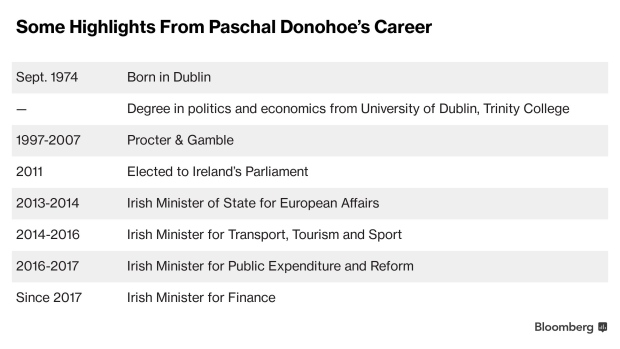Jul 9, 2020
Ireland’s Donohoe Wins Race to Lead Euro-Area Finance Ministers
, Bloomberg News

(Bloomberg) -- Ireland’s Paschal Donohoe won the race to take over as the president of informal but powerful group of euro-area finance ministers that will help to shape the region’s economic recovery.
Donohoe, 45, upset the odds to defeat the Spanish favorite Nadia Calvino and Luxembourg’s Pierre Gramegna. He will formally replace the outgoing Mario Centeno as leader of the group of the Eurogroup on July 13.
The Irish finance minister had positioned himself as a centrist candidate, who could span the divide between more fiscally conservative northern European nations and southern governments pushing for looser rules to help combat the economic impact of the coronavirus outbreak.
Donohoe will have to steer high-stakes negotiations among the currency bloc’s 18 other finance chiefs as they try to settle on the best policies to ensure the euro-area economy bounces back as quickly as possible.
At home, the Irishman has forged a reputation as a consensus builder, well-liked and respected by all sides. His electoral district on the River Liffey in north Dublin covers some of the poorest areas in the country, as well as the city’s gleaming financial center, home to companies such as Citibank.
The former European and transport minister was appointed finance minister in 2017, and kept hold of the job when the country’s first ever grand coalition took power last month. Fianna Fail’s Micheal Martin leads the coalition and made no effort to oust Donohoe, from Fine Gael, in a testament to his popularity even among political rivals.
In a 2018 speech, setting out his political vision, Donohoe said “at its heart, centrism is a political philosophy that incorporates ideas from both the left and the right of the political spectrum.”
“There has never been a time when a re-foundation of multilateralism has been more critical in the face of the fracturing of the liberal order and a resurgent nationalism,” he said.
While the president of the Eurogroup has no decision-making powers, the role calls for a skilled mediator who can broker agreements when the bloc faces major challenges.
Though less prominent than during the euro-zone sovereign debt crisis, the position has been a sought-after post, giving its holder a seat at the table at important international gatherings. Originally designed as an informal meeting for finance ministers to exchange views, the group morphed into one of the most closely watched decision-making bodies in Europe.
Two priorities will include channeling funds to help European firms catch up to their peers in the U.S. and some parts of Asia in digitalization and making Europe a leader in tackling climate change.
©2020 Bloomberg L.P.







